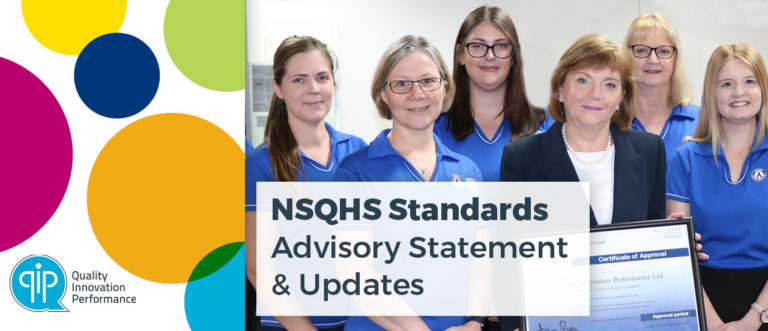Latest news

NSQHS Standards – Commission Advisory Statement and Updates
The Australian Commission on Safety and Quality in Health Care (the Commission) has recently released a number of Advisories and several updates relating to the National Safety and Quality in Health Service (NSQHS) Standards.
The Commission updates specifically refer to:
- Fact Sheet 4: Rating scale for assessment
- Submission of attestation statements
- Advisory AS18/10: Informed financial consent
- Advisory AS18/04: Advice on Aboriginal and Torres Strait Islander specific actions
- Advisory AS18/01: Advice on not applicable actions
Details relating to each update and associated Commission documentation can be found below. The majority of information provided in this communication has been taken directly from the Commission resources and can be accessed via the Commission’s website.
Fact Sheet 4: Rating scale for assessment
To support health service organisations in better understanding the rating scale for assessment against the NSQHS Standards, the Commission has released ‘Fact Sheet 4: Rating scale for assessment’.
The fact sheet details the process for rating actions met with recommendations, actions not met and details the revised NSQHS Standards (second edition) rating and associated descriptions.
Download a copy of the Commission’s ‘Fact Sheet 4: Rating scale for assessment’.
Submission of attestation statements (Actions 1.1 and 1.2)
Based on a number of queries from health service organisations in reference to transition arrangements for the NSQHS Standards (second edition), the Commission has advised that health service organisations have until 31 December 2019 to submit their annual attestation statements.
This timeframe applies even if a health service organisation is being assessed this year, and will not impact their accreditation status.
Provision of attestation statements relates to Actions 1.1 and 1.2 of the NSQHS Standards (second edition). For further clarification on the process for submitting attestation statements visit the Commission’s website.
Advisory AS18/10: Informed financial consent
Relates to Action 2.4: Healthcare rights and informed consent
Action 2.4 of the NSQHS Standards requires health service organisations to ensure that its informed consent processes comply with legislation and best practice.
This action is also inclusive of informed financial consent, being the provision of cost information to patients by all relevant service providers, preferably in writing, prior to admission to hospital or treatment.
The Commission notes informed consent cannot be sought or obtained in certain circumstances, including for some patients admitted from an emergency department. The Commission has released Advisory AS18/10: Informed financial consent to detail the relevant requirements for all private hospitals, public hospitals accessing private health insurance funding and approved accrediting agencies.
Advisory AS18/04: private and public hospitals
Private
Private hospitals must ensure they comply with the Private Health Insurance (Health Insurance Business) Rules 2018 (the Rules), which require a hospital to make provisions for informed financial consent.
A patient or nominee must be informed in writing of what hospital charges, insurer benefits and out of pocket costs (where applicable) are expected regarding the hospital treatment they are expected to receive.
A patient or nominee must be informed:
- For scheduled admissions – at the earliest opportunity before admission for hospital treatment
OR - For all other admissions – as soon after the admission as the circumstances reasonably permit.
Note: There are a number of reforms in place to support administrative arrangements for demonstrating compliance with informed financial consent requirements, as set out in the Rules.
Public
The Australian Government, states and territories have signed the National Health Reform Agreement to improve health outcomes for all Australians. This Agreement reaffirms the commitment by states and territories to ensure that eligible persons who have elected to be treated as private patients have done so on the basis of informed financial consent.
Public hospitals are required to provide a clear and unambiguous explanation of the consequences of private patient election. This explanation should include advice that private patients:
- Will be charged at the prevailing hospital rates for hospital accommodation for medical and diagnostic services, prostheses and any other relevant services
- May not be fully covered by their private health insurance for the fees charged for their treatment and that they should seek advice from their doctor(s), the hospital and their health fund regarding likely medical, accommodation and other costs and the extent to which these costs are covered.
Health service organisations that provide patients with written confirmation that the health service organisation charges will not exceed the insured rebate do not need to provide detail on the hospital fee, health insurer benefits or estimates of co-payments. When this statement is signed by the patient or their nominee it meets the requirements for informed financial consent.
Requirements
To support health service organisations with identifying whether or not they meet the specified requirements, our team has developed a checklist based on Advisory AS18/10 Informed financial consent. Download our QIP Checklist or refer to the Commission’s Advisory AS18/10 document for full details.
The Commission has also developed an example of an ‘Informed financial consent form’ which health services may like to customise to meet their organisation needs. This can be viewed as Attachment 1 within the Advisory Statement AS18/10: Informed financial consent document.
Advisory AS18/04: Advice on Aboriginal and Torres Strait Islander specific actions
To support culturally appropriate care for Aboriginal and Torres Strait Islander people, the NSQHS Standards (second edition) include six actions that specifically address the needs of Aboriginal and Torres Strait Islander people. The Commission strongly recommends that health service organisations implement all six actions, however the Commission also recognises that all six actions may not be applicable for all health service organisations, depending on the risk profile of the organisation’s patient population.
Requirements
As an overarching requirement, all health service organisations MUST comply with the following two actions:
- Action 1.21 – the health service organisation has strategies to improve the cultural awareness and cultural competency of the workforce to meet the needs of its Aboriginal and Torres Strait Islander patients
- Action 5.8 – the health service organisation has processes to routinely ask patients if they identify as being of Aboriginal and/or Torres Strait Islander origin, and to record this information in administrative and clinical information systems.
For all other requirements, implementation processes and exemptions of the six Aboriginal and Torres Strait Islander specific actions, view the Commission’s Advisory AS18/04: Advice on Aboriginal and Torres Strait Islander specific actions here.
Advisory AS18/01: Advice on not applicable actions
In some exceptional circumstances, actions from the NSQHS Standards may not be applicable to a health service organisation. The Commission has issued Advisory AS18/01: Advice on not applicable actions, to ensure the consistent application of not applicable status to actions within the NSQHS Standards.
Advisory AS18/01 contains a summary table of not applicable actions and how they apply hospitals, day procedure services, multi-purpose services, bush nursing services, patient transport services and public dental services.
If your health service considers an action to be non-applicable, you must submit an application for this non-applicable status to QIP well in advance of your assessment. QIP is required to refer to the Commission’s ‘Summary tables of not applicable actions’ when formulating a decision regarding the submission prior to the health service’s on-site assessment.
To view the ‘Summary tables of not applicable actions’ and for further details regarding the process for apply and obtaining a non-applicable status click here or refer to the Advisory AS18/01 on the Commission’s website.


